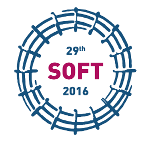Speaker
Shenghong Huang
(Modern mechanics)
Description
After years of exploration and development, research of magnetic confinement nuclear fusion is progressed into stage of experimental fusion reactor construction and test. As a key plasma-facing component, the anti-fatigue performance of first wall of fusion reactor receives widely concerns. Due to the fact of enduring both periodic loads of pulse operating mode and shock loads of transient events such as disruption, ELMs etc, the coupled fatigue responses of material and structure are in the state of very complex. It is significant and necessary to research the coupled mechanism of fatigue by both transient and periodic heat loads, which will be beneficial to develop the key and new technology of promoting anti-fatigue performance for the first wall of fusion reactors. With such motivations, a relative complete finite element analysis method based on a full coupled thermal/structural heat transfer equation with consideration of elastic/plastic constitutive relation as well as multiple kinds of thermal physical effects such as melting, solidification, evaporation etc. is established. With this method, the thermal/mechanical response of first wall and its fatigue performance are investigated. The results show that: (1) Heat is mainly deposited on PFM layer, leading to a mechanical irreversible damage of repeated thermal elastic and plastic expansion, contraction and yielding. the first wall with graded W-Cu PFM is potential of higher heat shock resistance performance. (2) The fatigue performance of first wall with PFM of Wu-Cu graded material is very different with different graded index parameter of material. An optimized index parameter is obtained. (3) The fatigue life time of first wall is decreasing nonlinearly with increase of heat loads magnitude,and the coupled peripdic normal loads and shock loads induced by transient events will greatly reduce the fatigue life time of first wall.
Co-authors
Shenghong Huang
(Modern mechanics, university of science and technology of China, hefei, China)
Shiming Liu
(Modern mechanics, university of science and technology of China, hefei, China)

